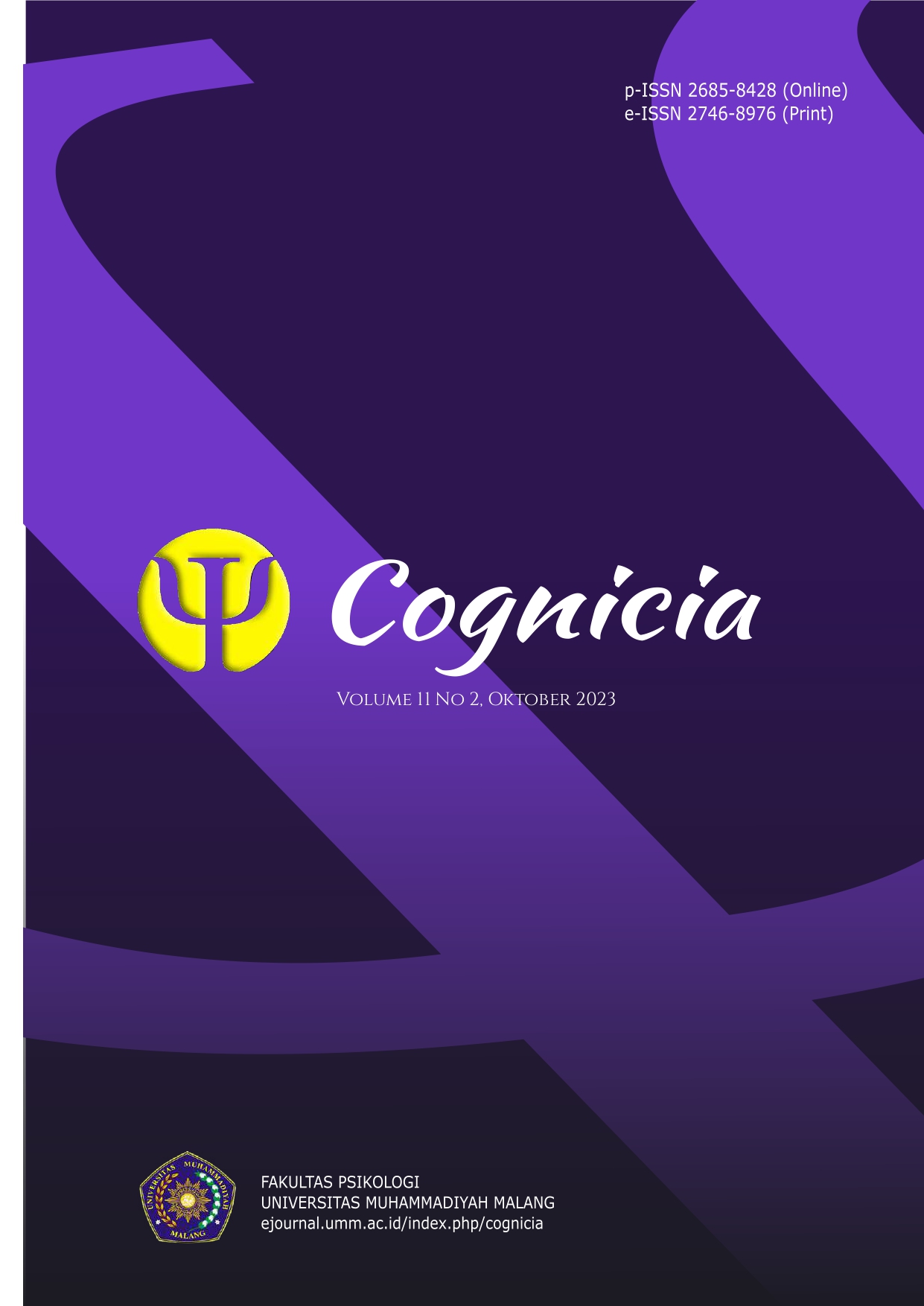Pengaruh kepribadian neuroticism dan extraversion terhadap fear of missing out pada remaja
DOI:
https://doi.org/10.22219/cognicia.v11i2.28471Abstract
Teenagers is individuals who are vulnerable to experiencing FoMO or fear of missing out. FoMO is a person’s concern about missing moment or activity with the people closest to them. Neuroticism and extraversion is the personality dimensions of the big five personality that can influence adolescents in experiencing FoMO. The purpose this study was to determine the effect neuroticism and extraversion personality on FoMO in adolescents and see which influence is greater between neuroticism and extraversion personality. Instruments used FoMO Scale and BFI. The results of the analysis using multiple linear regression show the probability (p=0.00) indicates that neuroticism and extraversion personality have an influence on FoMO in adolescents. The probability on the neuroticism variable (p=0.00) with a standardized value (β=0.41), while on the extraversion variable (p=0.04) with standardized value (β=0.17), the neuroticism variable has greater influence on the fear of missing out in adolescents than the extraversion variable.
Keywords: Adolescent, extraversion, fear of missing out, neuroticism
Downloads
References
Abubakar, R. (2021). Pengantar metodologi penelitian. Yogyakarta: SUKA-Press.
Astuti, C. N., & Kusumiati, R. Y. (2021). Hubungan kepribadian neurotisme dengan fear of missing out pada remaja pengguna aktif media sosial. Jurnal Ilmiah Bimbingan Konseling Undiksha, 12(2), 245-258. https://doi.org/10.23887/jibk.v12i2.34086
Axbar, R. S., Aulya, A., Aspari, A., & Sofia, L. (2018). Ketakutan akan kehilangan momen (Fomo) pada remaja Kota Samarinda. Psikostudia J. Psikol, 7(2), VII, 38-47.
Christina, R., Yuniardi, M. S., & Prabowo, A. (2019). Hubungan tingkat neurotisme dengan fear of missing out (FoMO) pada remaja pengguna aktif media sosial. Jurnal Ilmiah Psikologi, 4(2), 105-117. https://doi.org/10.23917/indigenous.v4i2.8024
Elhai, J. D., Yang, H., & Montag, C. (2021). Anxiety and stress severity are related to greater fear of missing out on rewarding experiences: A latent profile analysis. PsyCh Journal, 10(5), 688-697. https://doi.org/10.1002/pchj.455
Garaika, & Darmanah. (2019). Metodologi Penelitian. Lampung: CV. HIRA TECH
Harun, G. A. (2022). Pengaruh kepribadian extraversion terhadap fear of missing out pada remaja pengguna aktif instagram. Doctoral dissertation, Universitas Muhammadiyah Malang.
Hidayati, N., Syaf, A., & Hartati, R. (2021). Fear of missing out ditinjau dari big five personality. Psychopolytan : Jurnal Psikologi, 4(2), 77-83. https://doi.org/10.36341/psi.v4i2.1392
Ibrahim, A., Alang, A. H., Madi, Bahrudin, Ahmad, M. A., & Darmawati. (2018). Metodologi penelitian. Makasar: Gunadarma Ilmu.
Kemp, S. (2022). DIGITAL 2022: Indonesia. WE ARE SOCIAL. https://datareportal.com/reports/digital-2022-indonesia
Nurbaiti, F., Faradiba, A. T., & Aisyah. (2022). Peran faktor kepribadian extraversion, neuroticism personality trait terhadap problematic media sosial use pada remaja akhir pengguna twitter. Journal of Behaviour and Mental Health, III, 24-33. http://dx.doi.org/10.30984/jiva.v3i1.2028
Palilati, D. P. (2021). Analisis dimensi fear of missing out (FoMO) terhadap phubbing yang dibedakan berdasarkan jenis kelamin (Doctoral dissertation, Universitas Bosowa).
Przybylski, A., Murayama, K., DeHaan, C., & Gladwell, V. (2013). Motivational, emotional, and behavioral correlates of fear of missing out. Com puters in Human Behavior, 29(4), 1841-1848. https://doi.org/10.1016/j.chb.2013.02.014
Putra, A. D. (2018). Hubungan antara fear of missing out dengan kesejahteraan psikologis pengguna instagram pada masa transisi menuju dewasa. Published Bachelor Thesis, Universitas Sanata Dharma, Yogyakarta.
Rafisyah, N. M. (2021). Tipe kepribadian big five dan kelekatan persahabatan sebagai prediktor fear of missing out pada dewasa awal di Kota Makassar. (Doctoral Dissertation, Universitas Bosowa).
Rahayuningsih, T., & Sumaryanti, I. U. (2022). Pengaruh tingkat neuroticism terhadap fear of missing out (FoMO) pada mahasiswa pengguna instagram. Bandung Conference Series: Psychology Science, 2, 463-471. https://doi.org/10.29313/bcsps.v2i3.3096
Ramdhani, N. (2012). Adaptasi bahasa dan budaya inventori big five. Jurnal Psikologi, 39(2), 189-207. https://doi.org/10.22146/jpsi.6986
Ramadhani, P. E., & Krisnani, H. (2019). Analisis dampak perceraian orang tua terhadap anak remaja. Focus: Jurnal Pekerjaan Sosial, 2(1), 109-119. https://doi.org/10.24198/focus.v2i1.23126
Santrock, J. W. (2012). Life-span development edisi ketigabelas Jilid 1. Jakarta: Penerbit Erlangga.
Saraswati, P. (2019). Kemampuan self regulated learning ditinjau dari achievement goal dan kepribadian pada pelajar usia remaja. Indigenous: Jurnal Ilmiah Psikologi, (4)2, 69-78. https://doi.org/10.23917/indigenous.v4i2.7209
Savitri, I., Wicaksono, A. S., & Fastari, C. (2021). The effect of big five personality on fear of missing Out. Journal Universitas Muhammadiyah Gresik Engineering, Social Science, and Health International Conference (UMGESHIC), 1(2), 956-964. http://dx.doi.org/10.30587/umgeshic.v1i2.3499
Siddick, S., Mafaza, M., & Sembiring, L. S. (2020). Peran harga diri terhadap fear of missing out pada remaja pengguna situs jejaring sosial. Jurnal Psikologi Teori dan Terapan, 10(2), 127-138. https://doi.org/10.26740/jptt.v10n2.p127-138
Tresnawati, F. R. (2016). Hubungan antara the big five personality traits dengan fear of missing out about social media pada mahasiswa. Intuisis, 8(3), 179-185. https://doi.org/10.15294/intuisi.v8i3.8661
Downloads
Published
How to Cite
Issue
Section
License
Copyright (c) 2023 Rivaldi Izza Ramadhani, Cahyaning Suryaningrum

This work is licensed under a Creative Commons Attribution-ShareAlike 4.0 International License.
Authors who publish with Jurnal Cognicia agree to the following terms:
- For all articles published in Jurnal Cognicia, copyright is retained by the authors. Authors give permission to the publisher to announce the work with conditions. When the manuscript is accepted for publication, the authors agree to automatic transfer of the publishing right to the publisher.
- Authors retain copyright and grant the journal right of first publication with the work simultaneously licensed under a Creative Commons Attribution-ShareAlike 4.0 International License that allows others to share the work with an acknowledgment of the work's authorship and initial publication in this journal.
- Authors are able to enter into separate, additional contractual arrangements for the non-exclusive distribution of the journal's published version of the work (e.g., post it to an institutional repository or publish it in a book), with an acknowledgment of its initial publication in this journal.
- Authors are permitted and encouraged to post their work online (e.g., in institutional repositories or on their website) prior to and during the submission process, as it can lead to productive exchanges, as well as earlier and greater citation of published wor (See The Effect of Open Access).

This work is licensed under a Creative Commons Attribution-ShareAlike 4.0 International License







